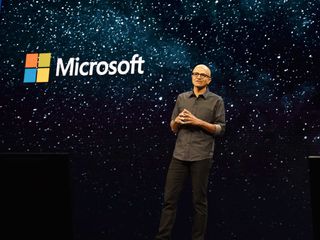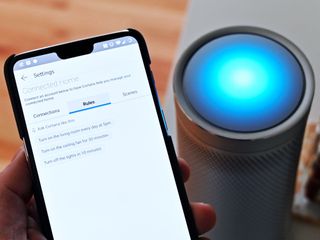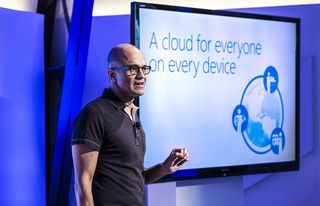Do we share too much about ourselves with Microsoft and others?
The success of social media platforms, digital assistants, intelligent systems and more rests on how much personal information we share. But are we sharing too much?

We live in the information age. That designation refers to the access we have to information that exceeds that which was accessible in previous generations. Given the amount of personal information we share over social media, apps, digital assistants and more the "information age" can justifiably be seen as an age where we share, versus consume, an unprecedented amount of information.
Privacy is an ever-eroding commodity we're sacrificing for convenience and exchanging for participation in the digital landscape that parallels our material world. Conversations, interactions, cliques, bullying, stalking, relationships, commerce, business, work, education, and more, transition continuously between the real and digital worlds.
Consequently, "credentials" or personal disclosures necessary to participate in these areas in the physical world are also needed or requested for one's participation of the same in the digital. The innate barriers that offer certain levels of security (.i.e. being offline) to our personal information on the physical landscape may not be sufficiently replicated on the broadly accessible digital plane, however. Thus, the liberal nature with which we trust entities with our most personal information may be positioning us for harm.
In the name of convenience

Microsoft's Cortana, like other digital assistants, can help support our daily activities. To be effective, however, they need access to a broad range of personal information.
Unlike other digital assistants, Cortana has a Notebook feature which allows users some granular control over what she knows about them. Still, for convenience sake, many people grant Cortana and other assistants carte blanche access to daily commute data, calendars, emails, flight data, connected homes, music, news, finance, and sports interests and more. Cortana will even wish a user Happy Birthday. She, or rather Microsoft, needs access to that information beforehand, however. Note, Cortana, Bing, Assistant, Windows and more are tools through which Microsoft and others glean information while serving users.
"Microsoft family" is a setting many enable to disclose who our family members are for the convenience of "coordinating and tracking shared events." Microsoft even wants users to enable Cortana's "Connect services" feature to integrate LinkedIn, Outlook, Wunderlist, Office 365, Skype and Gmail data into Microsoft's profile of a user. From a user's perspective reminders to follow up on something said in an email can be useful - or eerie.
For Microsoft, access to users' digital experiences, connections, interests and more via its cloud-based AI-driven assistant, Cortana, gives the company profound access to a comprehensive profile of hundreds of millions of users. The same is true of Google with Assistant and other services where we grant AI permission to "know" us. As Cortana and AI are further integrated into Windows 10, Microsoft may gain even deeper user insights.
Get the Windows Central Newsletter
All the latest news, reviews, and guides for Windows and Xbox diehards.
The ID2020 Alliance and universal IDs

Last year Microsoft announced it is a founding member of the ID2020 Alliance. ID2020 is an alliance of governments, non-profits, academia, over 150 private companies and 11 United Nations agencies whose goal is to provide a unique digital identity to everyone on the planet by 2030. The Alliances Governance material reads:
By 2030 it aims to have facilitated the scaling of a safe, verifiable, persistent digital identity system, consistent with the Sustainable Development Goals agreed upon by the United Nations.
Microsoft reiterated its support of universal ids:
Each of us needs a digital identity we own, one which securely and privately stores all elements of our digital identity.
Additionally, ID2020's Technical Certification Mark strives to create universal standards for good digital identity.
As we observe these goals in light of the personal information we freely give Microsoft and others, and Microsoft's aggressive strategy to merge our professional and personal digital identities a broader picture emerges. We see the company's efforts to use cloud and AI to bring all of our digital activity under one, easily managed umbrella; One that fits well within the vision of the ID2020 Alliance.
Tracking everything you do
Companies like Google and Facebook monitor our web activity and mine a large cross-section of millions of users personal data encompassing what we post, share and search for online. Gabriel Weinberg, the founder of DuckDuckGo, revealed (above video) how companies track users' activity.
Google and Facebook use hidden tracking technology to see the pages users and the people they're connected to visit, to tailor their ads better. One study revealed Google has trackers on 76-percent of websites while Facebook has trackers on 23-percent.
Most users don't realize these companies diligently "follow" their digital activity, despite receiving ads that are often so eerily personal, it seems that their devices are listening to them.
Privacy no more




Billions of people provide platforms like Facebook with their names, birthdates, familial associations, friends, places, books and activities of interest, pictures (that Facebook scans with facial recognition software), job history, education information, life changes, picture locations and so much more. If we were asked to provide half that information by certain entities, we'd likely plead the fifth amendment: or refuse to provide self-incriminating evidence.
Still, we trust companies with a comprehensive cross-section of who we are. As current events related to Facebook and privacy, ongoing concerns about Google's privacy practices and growing concerns about Microsoft's use of Windows 10 and Cortana to cull personal information prove, companies have not earned that level of trust.
To escape these downsides of the information age users will have to opt out of some of the conveniences of A.I.-assisted support when setting up Windows 10, Cortana and other services, not use certain apps that require personal data, forego certain levels of social media interaction and curtail their browsing activity. Sadly, our physical and digital lives are so intertwined most people are willing to continue allowing privacy to erode while hoping for the best.
Jason L Ward is a columnist at Windows Central. He provides unique big picture analysis of the complex world of Microsoft. Jason takes the small clues and gives you an insightful big picture perspective through storytelling that you won't find *anywhere* else. Seriously, this dude thinks outside the box. Follow him on Twitter at @JLTechWord. He's doing the "write" thing!
